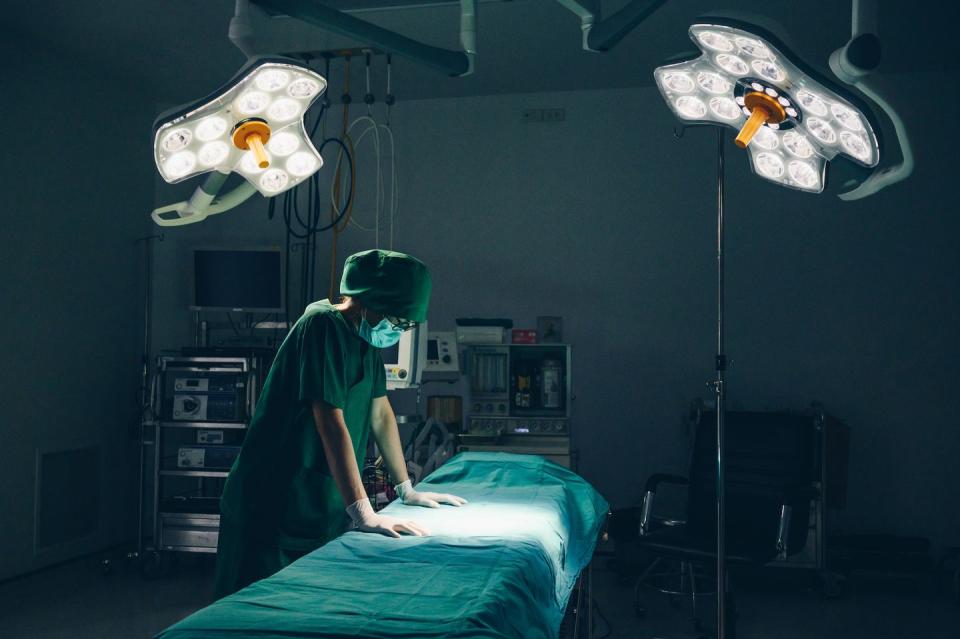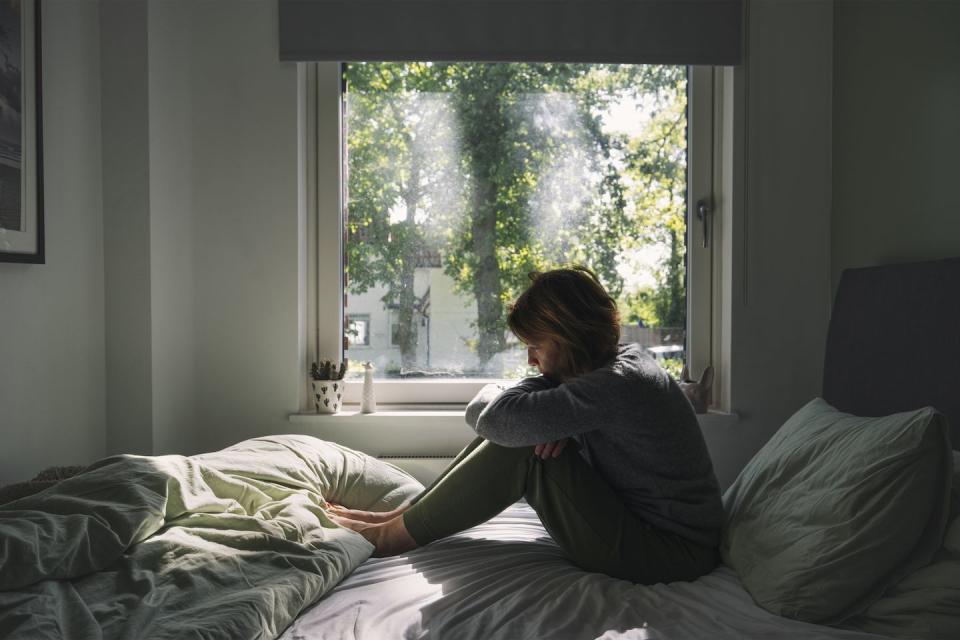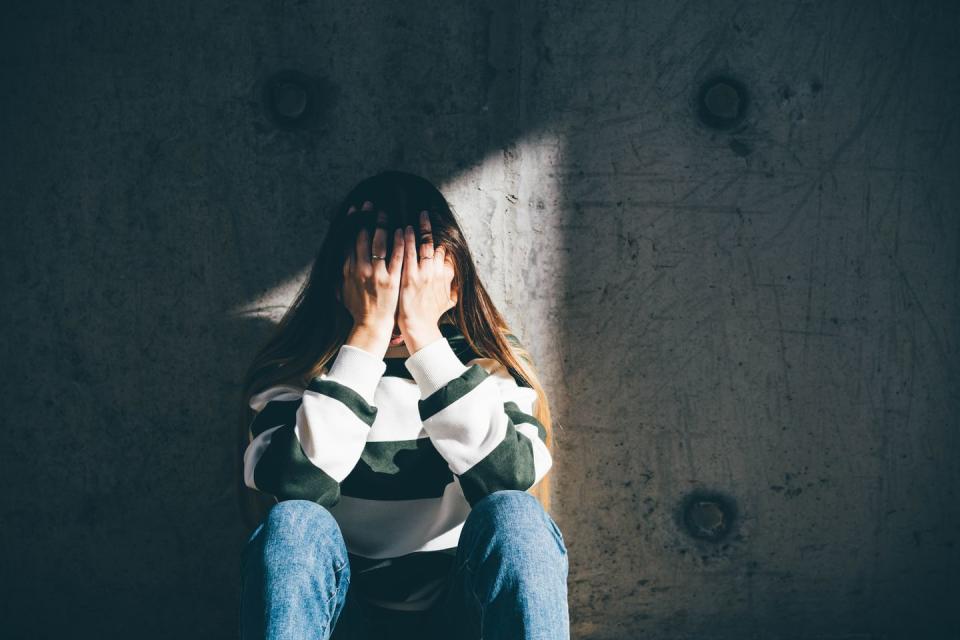Why We Need To Stop Conflating Burnout With Being Busy And Take It Seriously

When Dr Claire Ashley was working full-time as a GP, she was expected to see up to 50 patients a day, on top of admin, meetings and visits. She also wasn’t sleeping, and struggled to find time in the day to eat, drink water, or even go to the toilet. ‘I didn’t recognise myself,’ she says. ‘I would sit at my desk and look at all the work I had to do, and I would want to run away screaming.’
The breaking point came when she had a panic attack at home one evening while on the phone to her husband, who was working away at the time. ‘I had never experienced panic attacks before. He was like, “What is going on?” And I suddenly thought, Wow, I’m really in over my head here.’
It had taken her six months to go from fully functional – high-achieving, no mental health problems, loving her job – to a shell of her previous self. She became irritable with her kids, dreaded going to work and was more tired than she had ever been. What she was experiencing, she would come to understand, was burnout.
The hashtag #burnout has been used over 200,000 times on TikTok alone. Although the word gets thrown around on social media, and many interpretations of its meaning exist, the World Health Organisation (WHO) defines burnout as a syndrome tied to unsuccessfully managed workplace stress. It’s made up of three parts: exhaustion, feeling distant or cynical towards your job and reduced performance at work.
Yet this narrow set of criteria plays into the misconception that burnout is exclusively due to work stress. Rather, you can think of burnout as a pile-on of stressors from different areas of life, forming a perfect, debilitating storm.

‘The WHO definition doesn't include stress from parental or caregiver burnout, or as a result of ADHD or Autistic Spectrum Disorder,’ says Dr Ashley, who has since become an expert on the topic and a self-proclaimed ‘Burnout Doctor’. ‘Personally, I think you can get burntout from any chronic-stress situation.’
FIND OUT MORE ON ELLE COLLECTIVE
However you categorise it, burnout is serious. In severe cases, it causes premature ageing of the brain and, if you're under 45, your chance of dying from all causes goes up, as indicated by a study by scientific journal PLOS One. Dr Ashley estimates it can take one to three years to recover.
With such a specific definition, and such grave connotations, you’d be forgiven for thinking burnout is a rare occurrence. But according to Mental Health UK, almost one in four adults feel unable to handle the stress and pressure in their lives. And – because the female population just hasn’t been through enough – the charity’s 2024 ‘Burnout Report’ shows women are even more susceptible, with 93% experiencing extreme stress compared to 88% of men. Women are also less likely to take time off work for mental health reasons.
‘Burnout impacts women more because of societal expectations for us to handle the majority of the domestic chores and social events, as well as working,’ says Sheena Schuy, a therapist and business coach. ‘Meanwhile, some workplace cultures reward people for sacrificing their lives, putting the job above all other things or working overtime.’

Women are an endangered group for a whole host of reasons, including personality factors like a propensity for people-pleasing, perfectionism and imposter syndrome. According to a survey by KPMG, 75% of female executives across industries have experienced imposter syndrome in their careers.
These factors had a drastic impact on 30-year-old Ava*, who burnt herself out trying to take on too much work. ‘I work at a secondary school on the pastoral team, I do lunchtime duty and I’m a classroom assistant,’ she lists off. ‘I also work as a counsellor when I can. My timetable is full. By the time I get home, I’m completely wiped out.’
Ava, who has autism, says that some of the pressure she felt to work so hard was self-inflicted. ‘I feel my own pressure to be perfect. I’m at risk of imposter syndrome, and often worry I might lose my job,’ she says, as a result of her spectrum disorder. ‘I ended up with no time – I became really spaced out and absolutely exhausted. One day, I forgot to do something and just spiralled.’
For Meredith Pierce, 30, a solo-traveller with a full-time job in digital marketing, burnout struck when she began making travel content for TikTok. ‘I was so excited to be doing brand deals, I would take anything that was offered,’ she says. ‘Eventually, I got stressed out trying to maintain my 9-to-5, the content creation and the physical stressors of travel – sleep deprivation, culture shock, sickness and my depleting social battery.’
Despite how hectic these women’s schedules sound, being constantly busy has seemingly become the new normal. While celebrities from Kim Kardashian to Molly-Mae Hague are mocked for their out-of-touch advice for women in business, many of us absorb the subtler, though still insidious, symptoms of hustle-culture. Influencers collectively garner billions of views on their morning routine videos; lengthy regimens that often involve eating a gut-healthy, protein-rich breakfast, working out twice, journaling, meditating and getting work done, all before 9am. As TikToker Anayka She states in a viral video, ‘There is no way that any of you are doing all of that’.
Schuy stresses that being productive all the time is not sustainable: ‘We’ve been conditioned to believe working 40 hours a week plus exercise, taking care of kids, cleaning, cooking and trying to have a social life is “normal”, when, from an evolutionary perspective, it absolutely is not.’
As well as the internal pressures women confront, external factors like having to bear the brunt of childcare and home management duties also increase burnout likelihood. A study by the Maven Clinic during the pandemic found that working mothers were 28% more likely to experience burnout than working fathers. ‘Out of women, it’s mothers. Then it's Black working mothers who are the most at-risk group,’ says Dr Ashley. ‘Other things reduce your capacity for stress; work is the thing that tips you over the edge.’
But how do you tell the difference between a ‘normal’ level of stress and an approaching burnout?
‘If you’re just stressed about an event or project, you’ll bounce back fairly quickly afterwards,’ explains Schuy. ‘If you’re not bouncing back, then it’s likely you're burntout. You won’t have the energy to do things you’d usually do.’

The warning signs, says Dr Ashley, are aches, pains and constant fatigue. ‘You’ll have difficulty sleeping, and won’t be able to control your emotional responses to stress. You'll fly off the handle or burst into tears over things that wouldn't normally upset you – which I experienced.’
In the midst of her burnout, Ava became nocturnal. ‘I was constantly awake thinking about things I should do, and getting out of bed to do them,’ she says. ‘I’d get teary and upset, too. It got to the point where I felt very isolated.’
It took a family member noticing something was wrong for Ava to begin her recovery journey. ‘I had my family around me over the Christmas break, which helped, but I had to hide my work laptop, switch off notifications and even delete the app. I had to learn to separate my work and home identities.’
The first step towards getting better, the experts advise, is rest. ‘Rest means doing things for joy,’ Schuy says. ‘Not working out or listening to podcasts, as those still involve learning or productivity. True rest is seeing friends or creating art just for the fun of it. Many of us have lost the art of living life.’
Finding hobbies outside her phone helped content creator Meredith combat her exhaustion. ‘I saw a TikTok that said we’re consuming too much and need to start creating,’ she says. ‘I committed to cooking more. I bought some paint-by-numbers kits and colouring books to do on the road. Staying creative helped, so I didn't fall into a cycle of rotting.’
To carve out time for rest, Dr Ashley urges burnout victims to take time off work. ‘I know this isn’t accessible to everyone, but having that distance removes you from the source of your stress. Once your nervous system settles down, you can get the sleep you need.’
The next phase could include seeing a therapist or doctor, allocating time for yourself and setting boundaries at work. Which, for plenty of perfectionistic, ambitious women, is going to feel uncomfortable – even lazy. ‘You’re not lazy, you’re absolutely doing enough,’ says Schuy. ‘But you have to adjust your expectations of yourself moving forward to avoid burnout turning into depression or a health issue.’
Adjusting her expectations was one of the hardest steps for Ava. ‘I had to become assertive; to say to my manager, “I’m taking on too much.” I used to give 100% everyday, or I thought I wasn’t doing my job. What helped me was giving 70% and learning to be happy with that. And, actually, this made me more productive.’
Could curbing our overachieving tendencies be the way through this burnout epidemic? If so, Gen Z is leading the low-effort movement, with trends like ‘quiet-quitting’ showing young people’s unwillingness to go above and beyond if employers aren’t matching that energy (read: paying us more). This, alongside an obsession with all things wellness – Gen Z and Millennials are spending more on health products and services than older consumers – could signal a shift towards better work-life balance as more Zoomers enter the workforce.
Covid also influenced perceptions of labour, causing us to collectively pause and assess our priorities. And the dawn of working from home has given people more time and made them less tired. ‘Remote working can dramatically help burnout,’ says Schuy. ‘A lot of people are more efficient, so they can go for a walk at lunch, eat outside or see friends. This plays a vital role in a more balanced approach to work, and has benefits such as avoiding the commute, not feeling micromanaged or pressured to “look good” every day.’
While many blame themselves for ending up burntout – according to Psychology Today, women are even more likely to hold onto guilt – it’s important to let self-criticism go. This is something Dr Ashley is working through, even now: ‘I still carry a lot of shame about how I was during that time, but it wasn't my fault.’
To tackle burnout, and those complex feelings around it, you have to feel supported by those close to you, and yourself. ‘You need good relationships at work and at home,’ says Dr Ashley, ‘and, most of all, you need to trust that you are in control of your own wellbeing.’
*Some names have been changed
ELLE Collective is a new community of fashion, beauty and culture lovers. For access to exclusive content, events, inspiring advice from our Editors and industry experts, as well the opportunity to meet designers, thought-leaders and stylists, become a member today HERE.
You Might Also Like


